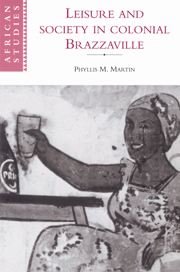Book contents
- Frontmatter
- Contents
- List of plates
- List of maps
- List of tables
- Acknowledgements
- List of abbreviations
- Introduction
- 1 An African crossroads, a frontier post and a colonial town, c. 1880–1915
- 2 Taking hold of the town, c. 1915–1960
- 3 The emergence of leisure
- 4 Football is king
- 5 About the town
- 6 Dressing well
- 7 High society
- Conclusion
- Notes
- Bibliography
- Index
- Titles in the series
6 - Dressing well
Published online by Cambridge University Press: 09 November 2009
- Frontmatter
- Contents
- List of plates
- List of maps
- List of tables
- Acknowledgements
- List of abbreviations
- Introduction
- 1 An African crossroads, a frontier post and a colonial town, c. 1880–1915
- 2 Taking hold of the town, c. 1915–1960
- 3 The emergence of leisure
- 4 Football is king
- 5 About the town
- 6 Dressing well
- 7 High society
- Conclusion
- Notes
- Bibliography
- Index
- Titles in the series
Summary
At the turn of the century, servants and labourers at the factories along the Pool marked New Year's Day by dressing in their finest clothes. Strolling along the Avenue Félix Faure which bordered the river, women wore ‘their most colourful cloths’. Men were dressed in waist-cloths or trousers and jackets. Some wore imported second-hand clothes such as frock coats and velvet opera hats. Particularly eye-catching were five ‘Loangos’ in white shirts, trousers and English army red coats. On Sundays, workers also cast aside their work clothes and donned their ‘Sunday best’.
Clothing is an important marker of time. As one writer has argued concerning Saturday night in America, dress ‘makes concrete ordinary time and extraordinary time’. During the week in Brazzaville, most people wore few or old clothes as they laboured in the hot climate on construction sites, at the factories, in the market, on the river or at their farms. Some who worked for Europeans wore special uniforms and, indeed, that was not least among the attractions of such jobs. Yet employers often issued or insisted on clothes that satisfied their dress conventions, communicated the subordinate role of workers, and accentuated their place in the colonial hierarchy. As was clear in the controversy over football boots, monitors, clerks and those with Western education had to wear regular European clothes to work. Indeed, clerks were fined ‘for lack of proper dress at the office’. Servants, on the other hand, had to wear shorts and neither they nor waiters were allowed to wear shoes.
- Type
- Chapter
- Information
- Leisure and Society in Colonial Brazzaville , pp. 154 - 172Publisher: Cambridge University PressPrint publication year: 1996

